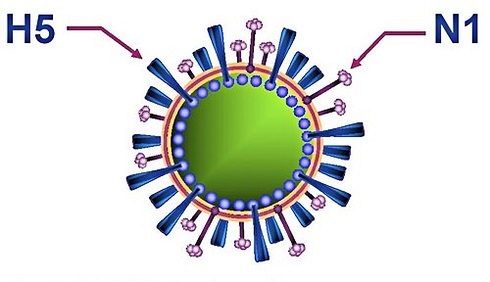H5N1 Avian Flu News: Preparing For An Imminent Outbreak. What Prophylactics, Drugs And Supplements Work? (Part 1)
H5N1 Avian Flu News Feb 09, 2023 3 years, 1 week, 3 days, 20 hours, 30 minutes ago
H5N1 Avian Flu News: In the last two months, mainstream media has been abuzz about the H5N1 Avian flu virus that is wreaking havoc in poultry farms across the world, causing a shortage of not only poultry products but also eggs. Reports have also emerged that the H5N1 Avian flu virus is also infecting various mammals extensively and that it is only a mater of time before the virus effectively evolves to infect humans although isolated cases of zoonotic transmission to humans have already been documented.
 https://www.nbcnews.com/science/science-news/avian-bird-flu-egg-prices-rcna66273
https://www.npr.org/2022/12/02/1140076426/what-we-know-about-the-deadliest-u-s-bird-flu-outbreak-in-history
https://www.theguardian.com/environment/2023/jan/12/pandemic-potential-bird-flu-outbreaks-fuelling-chance-of-human-spillover
https://www.bloomberg.com/news/articles/2022-12-19/bird-flu-epidemic-and-farm-culls-will-make-eggs-chicken-turkey-expensive#xj4y7vzkg
https://www.who.int/docs/default-source/wpro---documents/emergency/surveillance/avian-influenza/ai_20230203.pdf
https://www.nbcnews.com/science/science-news/avian-bird-flu-egg-prices-rcna66273
https://www.npr.org/2022/12/02/1140076426/what-we-know-about-the-deadliest-u-s-bird-flu-outbreak-in-history
https://www.theguardian.com/environment/2023/jan/12/pandemic-potential-bird-flu-outbreaks-fuelling-chance-of-human-spillover
https://www.bloomberg.com/news/articles/2022-12-19/bird-flu-epidemic-and-farm-culls-will-make-eggs-chicken-turkey-expensive#xj4y7vzkg
https://www.who.int/docs/default-source/wpro---documents/emergency/surveillance/avian-influenza/ai_20230203.pdf?
https://www.nytimes.com/2023/02/03/opinion/bird-flu-h5n1-pandemic.html
https://jamanetwork.com/journals/jama/fullarticle/2801499
https://www.msn.com/en-gb/news/world/h5n1-bird-flu-in-mammals-stoking-fears-of-human-spill-over/ar-AA14vi59
Latest
H5N1 Avian Flu News shows that the H5N1 Avian Flu has even killed more than 585 sea lion (which are mammals) in Peru.
https://www.cidrap.umn.edu/avian-influenza-bird-flu/peru-confirms-h5n1-avian-flu-marine-mammals-part-southward-spread
The highly pathogenic Avian H5N1 flu virus was first discovered in domestic waterfowl in Southern China with the first human infections reported in 1997 in Hong Kong.
It should be noted that while Influenza A virus subtype H5N1 (A/H5N1) is a subtype of the influenza A virus which can cause illness in humans and many other animal species, we are at the moment concerned ab
out a bird-adapted strain of H5N1, called HPAI A(H5N1) for highly pathogenic avian influenza virus of type A of subtype H5N1, which is the real highly pathogenic causative agent of Avian H5N1 flu, commonly known as avian influenza ("bird flu"). It is enzootic (maintained in the population) in many bird populations, especially in Southeast Asia.
https://www.nature.com/articles/nature02746
https://www.ncbi.nlm.nih.gov/pmc/articles/PMC4001451/
At present One strain of HPAI A(H5N1) is spreading globally after first appearing in Asia. It is epizootic (an epidemic in nonhumans) and panzootic (affecting animals of many species, especially over a wide area), killing tens of millions of birds and spurring the culling of hundreds of millions of others to stem its spread. Many references to "bird flu" and H5N1 in the popular media refer to this strain.
Though HPAI A(H5N1) is considered an avian disease, there is some evidence of limited human-to-human transmission of the virus.[10]
https://www.nejm.org/doi/full/10.1056/NEJMoa044021
A major risk factor for contracting the virus is handling of infected poultry.
Alarmingly, around 60% of humans known to have been infected with the Asian strain of HPAI A(H5N1) have died from it, and H5N1 may mutate or reassort into a strain capable of efficient human-to-human transmission.
It is speculated that an outbreak of avian influenza could kill anywhere between 50 million and 600 million people.
Due to the high lethality and virulence of HPAI A(H5N1), its endemic presence, its increasingly large host reservoir, and its significant ongoing mutations, the H5N1 virus has been regarded to be the world's largest pandemic threat.
While the WHO claims that the mortality rate for H5N1 Avian flu infections is about 53 to 60%, studies have showed that the realistic value could be between 14 to 33%.
https://jech.bmj.com/content/62/6/555
In terms of conventional prophylactics that the medical community would be typically advocating are the various H5N1 Flu vaccines that have been developed by various pharma giants and even new mRNA vaccines being developed by the infamous duo: Pfizer and Moderna.
In terms of anticipated antivirals that will be used to treat the disease once there an outbreak are the following drugs:
-viral neuraminidase inhibitors such as oseltamivir and zanamivir, which have already been used to treat human influenza A (H1N1 and H3N2) and B virus infections.
-M2 ion channel blockers such as amantadine and rimantadine which are compounded by the rapid development of drug resistance.
-ribavirin and pegylated interferon might also be useful for controlling avian flu.
https://www.ncbi.nlm.nih.gov/pmc/articles/PMC7112898/
https://www.cdc.gov/flu/avianflu/novel-av-treatment-guidance.htm#:~:text=Most%20avian%20influenza%20A(H7N9,adamantanes%20(amantadine%20and%20rimantadine).
https://www.gov.uk/government/publications/avian-influenza-guidance-and-algorithms-for-managing-incidents-in-birds/management-of-contacts-of-highly-pathogenic-avian-influenza-h5n1-during-the-2022-to-2023-avian-influenza-season
It should be noted that many of these drugs are already running in short supply around the world as many people are already starting to stockpile these drugs.
Many credible generic versions of oseltamivir and zanamivir are still available and it is strongly recommended for those who are concerned to stockpile these drugs which have a shelf-life of about 4 to 6 years and to only use them under the guidance of a licensed doctor to avoid developing resistance.
It has been reported there is an acute shortage of the APIs or active pharmaceutical ingredients for the manufacture of both oseltamivir and zanamivir, hence despite advice form health agencies not procure and stockpile these drugs, experience has taught us is to not pay heed to their advice and focus on caring for ourselves and our loved ones first!
In term of supplements, the phytochemical Elenolic acid which is one of the most important olive leaf secondary metabolites has shown to inhibit neuraminidase activity and is effective as antiviral against many flu viruses.
https://pubmed.ncbi.nlm.nih.gov/34839747/
https://www.ncbi.nlm.nih.gov/pmc/articles/PMC8641117/
https://nexusacademicpublishers.com/uploads/files/AAVS_5_11_436-445.pdf
Again, we strongly suggest that people stockpile credible brands of olive leaf extracts as stocks of many brands are already running low.
Some unpublished studies show that a combination of both oseltamivir with olive leaf extracts display show enhanced viral clearance and fast disappearance of associated symptoms when used during various types of flu infections.
Thailand Medical News will be covering more potential prophylactics, therapeutics and phytochemicals that can be used for the upcoming H5N1 Avian Flu pandemic and also other preparations that individuals should undertake.
For the latest
H5N1 Avian Flu News, keep on logging to Thailand Medical News.
